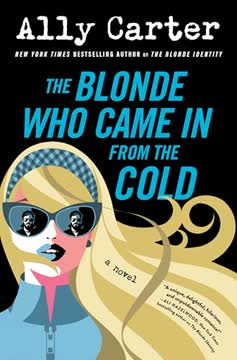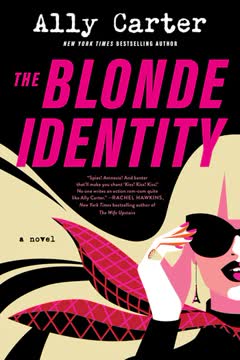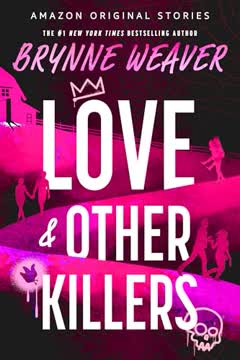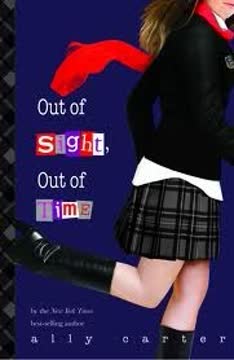Plot Summary
The Last Night Before
Alexandra Sterling, on the eve of entering the CIA's clandestine training, spends her last night as a civilian in a hotel bar, indulging in chicken fingers and trashy TV. She's approached by a mysterious man—Michael Kingsley—who reads her with unnerving accuracy and warns her not to get on the bus to spy school. Their charged encounter is a collision of wit, attraction, and foreboding, setting the tone for their future. Despite his warning, Alex boards the bus the next morning, only to find Kingsley is her classmate. The night is a microcosm of Alex's life: craving connection, haunted by guilt over her twin sister's illness, and drawn to danger. The emotional undercurrent is one of anticipation, regret, and the thrill of stepping into the unknown.
Waking in the Dark
Years later, Alex wakes up handcuffed in a dark, filthy room, her memory of recent events gone. She's no longer a spy, having disappeared after a disastrous mission, but someone has found her. Her training keeps her calm, but the uncertainty gnaws at her: who brought her here, and why? The past year of hiding, the trauma of her career, and her complicated relationship with her own sense of worth all swirl in her mind. When she realizes she's not alone—Michael Kingsley is there, also restrained—their reunion is laced with old wounds and unresolved tension. The darkness is both literal and metaphorical, a crucible for the secrets and regrets that have defined her life.
Arrival at the Farm
Flashing back to their first day at the CIA's "Farm," Alex and Kingsley are thrown into a world where nothing is as glamorous as the movies. The legendary instructor, Margaret Merritt, makes it clear: to survive, they must shed their old lives and embrace a world of secrets, lies, and loneliness. Alex's bravado masks her fear and her desperate need to prove herself, especially in the shadow of Kingsley's legacy. The recruits are told that only a few will make it, and that the cost is everything they once were. The emotional arc is one of intimidation, competition, and the first sparks of the rivalry—and connection—between Alex and Kingsley.
Tied Together Again
In the present, Alex and Kingsley, handcuffed together, must escape their captors. Their banter is sharp, their teamwork instinctive despite the bitterness of their past. The physical constraint is a metaphor for their emotional entanglement: they can't escape each other, no matter how much they try. As they fight their way free, old patterns reemerge—Kingsley's protectiveness, Alex's recklessness, and the grudging respect that underlies their antagonism. The escape is both a literal and figurative breaking of chains, but it leaves them with more questions than answers about who wants them dead—and why.
Lessons in Escape
Back at the Farm, Alex and Kingsley are thrown into a test: locked in a car trunk, drugged, and left to escape. Alex's ingenuity and Kingsley's methodical approach clash and complement each other. Their rivalry is fierce, but so is their chemistry. The test is a microcosm of their relationship—competition, frustration, and the thrill of outsmarting the system together. It's also the beginning of a grudging partnership, as they realize that survival depends on trusting each other, even as they push each other's buttons.
The First Test
In the present, their escape from the shack is a chaotic dance of violence and improvisation. Still handcuffed, they fight off their captors with a mix of skill and luck. The adrenaline of survival strips away their defenses, exposing the raw nerves of their shared history. The fight is brutal, but it's the aftermath—when they're finally free, but still tethered by the past—that hurts most. The emotional arc is one of exhaustion, relief, and the painful recognition that their connection is as much a liability as it is a strength.
Ghosts and Legacies
At the Farm, Alex's therapy sessions reveal the deep guilt she carries over her twin sister Zoe's illness. Kingsley's own legacy—descended from a line of legendary spies—haunts him, setting impossible standards and isolating him from his peers. Their rivalry is fueled by insecurity and the need to prove themselves, not just to the Agency, but to the ghosts of their families. The emotional landscape is one of longing, resentment, and the slow, painful process of understanding each other's wounds.
Rivals and Allies
As training progresses, Alex and Kingsley's rivalry deepens, but so does their understanding of each other. A late-night sparring match in the gym becomes a turning point: their physical fight is a proxy for all the things they can't say. Kingsley's admission that Alex is "too beautiful" to be a spy is both a compliment and a curse, highlighting the ways they see—and missee—each other. The emotional arc is one of vulnerability, anger, and the first glimmers of something like love, buried under layers of pride and pain.
Cartagena's Honeymoon
On their first real mission, Alex and Kingsley are forced to pose as a married couple in Cartagena, tasked with swapping a bag of emeralds for a set of tracked stones. The cover is both a shield and a crucible: their fake intimacy blurs into real attraction, and the mission's danger heightens every emotion. The operation is a success, but the cost is high—trust is tested, boundaries are crossed, and the line between cover and reality becomes dangerously thin. The emotional arc is one of longing, jealousy, and the ache of wanting what they can't have.
Emeralds and Deceptions
The emerald operation sets off a chain of events that will haunt them for years. The stones are tracked, leading to new players and new dangers. Alex and Kingsley's partnership is both their greatest asset and their greatest vulnerability. The mission's success is overshadowed by the realization that they are pawns in a larger game, manipulated by Merritt and hunted by enemies they can't see. The emotional arc is one of paranoia, betrayal, and the desperate need to hold onto each other in a world where nothing is safe.
The Mission Unravels
Years later, after a disastrous mission in Berlin, Alex is wounded and forced to seek refuge with Kingsley. Their reunion is fraught with pain and regret: he's left the Agency, she's about to go deep undercover, and neither can admit how much they need the other. Their night together is a bittersweet interlude—tenderness, anger, and the knowledge that they are about to be separated by choices neither can undo. The emotional arc is one of heartbreak, longing, and the impossibility of a happy ending.
Handcuffed in Vegas
In the present, Alex and Kingsley wake up handcuffed together in Las Vegas, with no memory of how they got there. Pursued by unknown enemies, they must rely on each other to survive. The city's chaos mirrors their internal turmoil: old wounds are reopened, secrets are revealed, and the line between love and hate blurs once again. The emotional arc is one of confusion, fear, and the slow, painful process of remembering who they are—to themselves and to each other.
Running the Strip
Their escape through Las Vegas is a frantic race against time and enemies. Forced to improvise, they use every skill they've learned—deception, combat, and the ability to disappear in a crowd. The city's lights and noise are both cover and threat, amplifying the tension between them. As they run, old arguments resurface, but so does the trust that has always underpinned their partnership. The emotional arc is one of adrenaline, desperation, and the fragile hope that they might survive—together.
The Past Returns
Flashbacks to their time undercover—on a Caribbean island, in Amalfi, in Berlin—reveal the depth of their connection and the betrayals that have shaped them. Each mission is a test: of skill, of loyalty, of love. The past is never really past; every secret, every lie, every moment of vulnerability comes back to haunt them. The emotional arc is one of nostalgia, regret, and the dawning realization that they can't outrun their history—or each other.
The Island of Lovers
Sent to a couples' retreat on a private island, Alex and Kingsley must pose as a troubled married couple. The island's absurd therapy sessions—trust falls, cuddle time, and forced confessions—become a crucible for their real issues. The mission is to infiltrate a fortress on the other side of the island, but the real challenge is navigating their feelings. The emotional arc is one of humor, frustration, and the painful honesty that comes from being forced to play at love when the feelings are all too real.
Trust Falls and Tunnels
The mission's turning point comes when Alex and Kingsley discover a hidden tunnel beneath a waterfall, the only way into the enemy's stronghold. The physical danger is matched by emotional risk: trapped together, they must confront the truth about their feelings and the choices that have kept them apart. The escape is a triumph, but it comes at a cost—trust is both earned and broken, and the future is more uncertain than ever.
The Double Agent's Ring
The true MacGuffin emerges: a platinum ring, once belonging to a legendary double agent known as Nikolai, now sought by every intelligence agency and criminal in the world. The ring is more than a symbol; it contains secrets that could destroy lives and shift the balance of power. Alex and Kingsley are caught in a web of betrayal, hunted by old friends and new enemies. The emotional arc is one of paranoia, sacrifice, and the realization that some secrets are too dangerous to keep—or to reveal.
Betrayal in Berlin
In Berlin, Alex is betrayed by a trusted ally and nearly killed. Wounded and desperate, she turns to Kingsley, who saves her life but can't save their relationship. The pain of betrayal is compounded by the knowledge that the enemy is always closer than they think. The emotional arc is one of isolation, grief, and the slow, painful process of healing—physically and emotionally.
The Year in Hiding
After Berlin, Alex disappears, going deep undercover to bring down a criminal empire. Kingsley, believing she's lost to him, spirals into obsession and despair. Both are haunted by what might have been, and by the knowledge that their choices have consequences far beyond themselves. The emotional arc is one of loneliness, regret, and the faint hope that redemption—and reunion—might still be possible.
The Trap in Paris
Lured to Paris by a trap set by a former friend turned enemy, Alex and Kingsley must confront the truth about the ring, about Nikolai, and about themselves. Allies become enemies, and enemies become allies, as the web of secrets unravels. The city's beauty is a stark contrast to the danger they face, and the stakes are higher than ever. The emotional arc is one of reckoning, forgiveness, and the possibility of a new beginning.
The Truth About Nikolai
The final pieces fall into place: the ring's secret is revealed, the true identity of Nikolai is exposed, and the real enemy is unmasked. The cost of the truth is high—lives lost, trust broken, and the realization that the past can never be undone. But in the ashes of betrayal, there is also hope: the chance to choose each other, to build a future not defined by secrets and lies. The emotional arc is one of catharsis, acceptance, and the first tentative steps toward healing.
Mercy and New Beginnings
With the danger past, Alex and Kingsley must decide what comes next. The scars of their journey remain, but so does the love that has survived every test. In a quiet moment, they choose each other—not as spies, not as rivals, but as partners. The story ends not with a grand gesture, but with a simple word: "Mercy." It is both a surrender and a promise—a new beginning, built on the hard-won lessons of the past.
Characters
Alexandra Sterling
Alex is a prodigy—fluent in languages, a master of engineering, and a natural spy. Her drive is fueled by guilt over her twin sister Zoe's childhood illness, a wound that never fully heals. Alex's bravado masks deep insecurity and a desperate need to prove herself, especially in the shadow of Kingsley's legacy. She is reckless, resourceful, and stubborn to a fault, often pushing people away before they can leave her. Her relationship with Kingsley is a crucible: rivalry, attraction, and the ache of wanting what she fears she can't have. Over the course of the story, Alex learns to trust—not just others, but herself—and to accept that vulnerability is not weakness. Her journey is one of self-forgiveness, the courage to love, and the realization that she is more than the sum of her secrets.
Michael Kingsley
Kingsley is the scion of a legendary spy family, blessed (or cursed) with a photographic memory and a reputation he can never quite live up to. His brilliance is matched by his emotional reserve; he is methodical, controlled, and often cold, using intellect as armor against the world. Kingsley's rivalry with Alex is both a challenge and a lifeline—she is the only person who can match him, infuriate him, and make him feel alive. Beneath his stoic exterior lies a deep well of longing and regret, especially over the loss of his mother and the slow decline of his father. Kingsley's journey is one of breaking free from the weight of legacy, learning to risk his heart, and choosing love over duty. His relationship with Alex is the crucible in which he is finally forged into his own man.
Margaret Merritt
Merritt is the archetype of the old-school spy: sharp, ruthless, and always three steps ahead. As the head instructor at the Farm, she shapes Alex and Kingsley's careers—and their relationship—through a mix of tough love and calculated manipulation. Merritt's own history is shrouded in secrets, and her motives are never entirely clear. She is both protector and puppetmaster, using her proteges as pieces in a larger game. Her relationship with Kingsley is almost maternal, while with Alex it is more adversarial, pushing her to her limits. Merritt's ultimate revelation—that she, too, is entangled in the web of secrets surrounding the ring and Nikolai—forces her to confront the cost of a life built on lies.
Zoe Sterling
Zoe is Alex's identical twin, but their lives have been shaped by difference: Zoe's childhood illness and Alex's guilt over it. Zoe is the sun to Alex's storm—warm, empathetic, and unbreakably hopeful. Her relationship with Alex is both a source of strength and a source of pain, as Alex's choices often leave Zoe behind. Zoe's own journey—from fragile patient to independent woman—mirrors Alex's, and her eventual happiness with Sawyer is a beacon for her sister. Zoe is the embodiment of the life Alex fears she can never have, but also the proof that healing is possible.
Tyler
Tyler begins as a fellow recruit at the Farm, friendly and unthreatening—a contrast to Kingsley's intensity. Over time, his ambition curdles into resentment, and he becomes both a rival and a threat. Tyler's descent into betrayal is fueled by jealousy and a sense of inadequacy, leading him to become the story's final antagonist. His relationship with Alex is complex: once a friend, then a competitor, and finally an enemy. Tyler's arc is a cautionary tale about the dangers of living in someone else's shadow and the corrosive power of envy.
Jake Sawyer
Sawyer is a British operative who becomes Alex's ally during her years undercover. He is calm, competent, and unflappable—a grounding presence in a world of chaos. His relationship with Zoe is a model of the kind of love Alex struggles to believe in: steady, supportive, and built on trust. Sawyer's role is both as a foil to Kingsley and as a bridge between Alex's two worlds—the spy and the sister.
Franklin / TriBlade
Franklin is a wildcard: a former arms dealer turned informant, more interested in profit and survival than ideology. His connections and knowledge make him both a valuable ally and a dangerous enemy. Franklin's role is to complicate the moral landscape, forcing Alex and Kingsley to confront the blurry line between good and bad in the world of espionage.
Viktor Kozlov
Kozlov is the archetypal post-Soviet villain: a former KGB operative turned criminal mastermind. His obsession with secrets, power, and the ring drives much of the plot's danger. Kozlov is both a mirror and a warning for Alex and Kingsley—a reminder of what happens when the game becomes more important than the players.
Merritt's Father / The Kingsley Patriarch
Kingsley's father is a ghostly presence, his life and decline a cautionary tale about the cost of obsession. His legacy shapes Kingsley's choices and fears, and his secrets are the key to the story's final revelations.
Flora
Flora runs the couples' retreat on the island, her new-age nonsense masking a shrewd understanding of people. She is both a source of humor and a catalyst for Alex and Kingsley's emotional breakthroughs.
Plot Devices
Dual Timelines and Nonlinear Structure
The novel's structure alternates between the present-day thriller—Alex and Kingsley on the run, hunted by enemies—and flashbacks to their shared history: training at the Farm, early missions, betrayals, and heartbreaks. This nonlinear approach allows the reader to piece together the puzzle alongside the characters, deepening the emotional impact of each revelation. The dual timelines also serve to mirror the characters' internal journeys: the past is never really past, and every choice echoes forward.
The MacGuffin: The Double Agent's Ring
The platinum ring, once belonging to the legendary double agent Nikolai, is the story's central plot device. Sought by every intelligence agency and criminal, it is both a literal object of power (containing a hidden camera and secrets that could topple governments) and a metaphor for the burdens of legacy, the cost of secrets, and the danger of living in the past. The ring's journey—from Kozlov's collection to Alex's hands to Merritt's final disposal—traces the arc of the story's central themes.
Amnesia and Missing Time
The device of Alex and Kingsley waking up with no memory of how they got to Vegas, handcuffed together, is both a plot engine and a metaphor for their relationship. Stripped of context and control, they must rely on each other, confront old wounds, and rediscover who they are—to themselves and to each other. The missing time also serves as a red herring, masking the true enemy and heightening the sense of paranoia.
Undercover Identities and Role Reversals
Throughout the novel, Alex and Kingsley are forced into undercover roles—married couple, lovers, rivals—that both protect and endanger them. The tension between cover and reality is a constant source of conflict and growth: pretending to love each other forces them to confront their real feelings, while pretending to hate each other allows them to hide from vulnerability. The role reversals—Alex as the reckless one, Kingsley as the protector—subvert genre expectations and deepen the characters' complexity.
Foreshadowing and Callbacks
The novel is rich with foreshadowing: the warning not to get on the bus, the significance of the ring, the lessons of the Farm. Early scenes—Alex's last night of freedom, the first fight in the gym, the escape from the car trunk—are echoed in later moments, creating a sense of inevitability and emotional resonance. The final word—"Mercy"—is both a callback to their earliest fights and a symbol of their hard-won peace.
Analysis
Ally Carter's The Blonde Who Came in From the Cold is a masterful blend of romantic comedy, spy thriller, and psychological drama. At its core, the novel is about the cost of secrets—personal, familial, and political—and the ways in which love and trust are both weapon and shield in a dangerous world. Through the intertwined journeys of Alexandra Sterling and Michael Kingsley, Carter explores the burdens of legacy, the pain of guilt, and the courage required to choose vulnerability over self-protection. The novel's nonlinear structure and use of classic spy tropes—amnesia, double agents, MacGuffins—are subverted by sharp characterization and emotional honesty. In a genre often defined by cynicism, Carter offers a story where hope is hard-won, love is a risk, and mercy is the bravest choice of all. The ultimate lesson is that healing is possible, not by erasing the past, but by facing it together—and that the greatest adventure is not the mission, but the willingness to be truly seen.
Last updated:
Review Summary
The Blonde Who Came in From the Cold is a spy romance featuring Alex and King, former CIA partners reunited after a year apart. Readers praise the witty banter, slow-burn romance, and thrilling action sequences. The dual timeline and multiple POVs received mixed reactions, with some finding it confusing. Many enjoyed the character development and chemistry between the leads. While some found the middle section rushed, most reviewers recommended it as a fun, engaging read that successfully blends romance and espionage.
Blonde Identity Series
Similar Books
Download PDF
Download EPUB
.epub digital book format is ideal for reading ebooks on phones, tablets, and e-readers.












